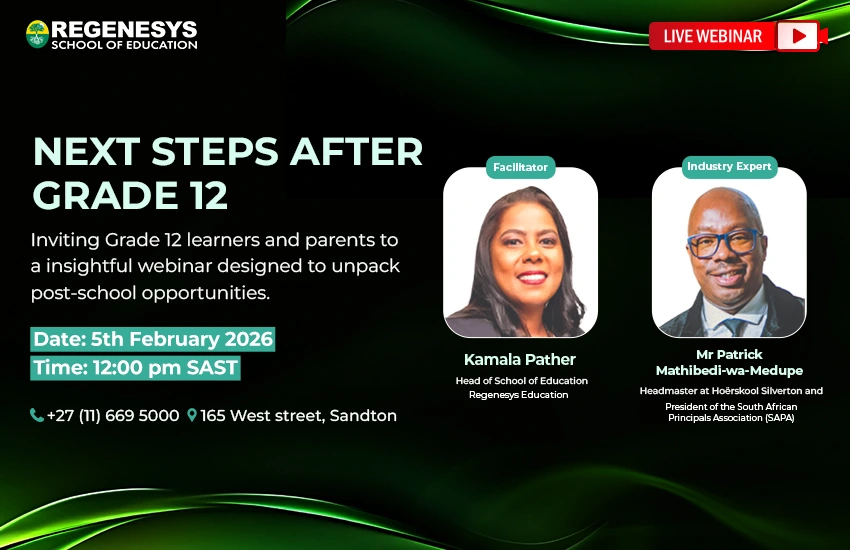Monitoring and Evaluation (M&E) plays a critical role in the success of public and development projects. It is more than just “checking” whether tasks have been completed – it is about assessing whether projects are achieving real impact, using resources effectively, and meeting community needs. In South Africa, where government and NGOs play a huge role in service delivery and development, M&E ensures transparency, accountability, and long-term results. Within the Bachelor of Public Management (BPM) programme, the Monitoring and Evaluation BPM specialisation offers learners the chance to gain deep insight into this field, equipping them for careers in governance, policy, and development.
In this article, we will explore what M&E is, the skills required, its use in NGOs and government, coursework and tools, career opportunities, and why this elective holds such importance for students of public management.
Table of Contents
- What is Monitoring & Evaluation (M&E)?
- Why Monitoring & Evaluation Matters in Public Project Success?
- Core Skills Needed in Monitoring and Evaluation BPM Specialisation
- M&E in NGOs and Government Projects
- Coursework in Monitoring and Evaluation BPM Specialisation
- Tools and Techniques in Monitoring & Evaluation
- Career Roles in Monitoring and Evaluation BPM Specialisation
- Monitoring and Evaluation as an Elective in the Regenesys BPM Programme
- Conclusion
- Monitoring and Evaluation BPM Specialisation – FAQ
What is Monitoring & Evaluation (M&E)?
Monitoring and Evaluation (M&E) is the systematic process of collecting, analysing, and using data to assess whether a project or programme is working as intended. It is a structured way of checking both short-term progress and long-term outcomes, ensuring that projects achieve the results they were designed for. M&E is not only about accountability but also about learning, improving, and creating positive, lasting change in communities.
It combines two important functions:
- Monitoring: This is the continuous tracking of activities, progress, and resource use. It helps managers understand whether projects are moving according to plan and within budget.
- Evaluation: This focuses on a deeper analysis of outcomes, sustainability, and effectiveness. Evaluations provide insight into whether projects have achieved meaningful change or simply delivered outputs.
When students choose the Monitoring and Evaluation BPM specialisation, they gain a strong foundation in both of these areas, learning to apply tools such as logic models, impact tracking, and data indicators to real-world challenges.

Why Monitoring & Evaluation Matters in Public Project Success?
Public projects in South Africa often deal with pressing issues such as poverty reduction, education reform, and health services. Without M&E, it becomes almost impossible to measure whether these initiatives are having a meaningful effect. M&E ensures that every rand spent is accounted for and every activity is tied to a clear outcome. This is especially critical in the South African context, where resources are limited and accountability is demanded by both the public and funding organisations.
Here are some reasons why M&E is so important:
- Accountability: M&E makes sure that public funds and donor resources are used responsibly. Tracking activities and results provides a clear record that can be reviewed by stakeholders.
- Transparency: Through structured reporting, M&E allows both the government and NGOs to demonstrate progress to the public, donors, and communities, building trust and credibility.
- Learning and Improvement: By using impact tracking tools, managers identify what is working and what is not. This allows for course correction during the life of a project, saving time and resources.
- Better Planning: When project teams use logic models and data indicators, they can design future projects with greater clarity, avoiding repeated mistakes and increasing success rates.
The Monitoring and Evaluation BPM specialisation makes these lessons practical, ensuring graduates understand not just what M&E is, but why it is a cornerstone of successful development and public service.
Read on Exploring the Core Subjects in Bachelor of Public Management (BPM) here!
Core Skills Needed in Monitoring and Evaluation BPM Specialisation
Professionals in M&E require a unique mix of skills that blend analytical ability with communication and ethical judgement. These skills ensure that evaluation reports are accurate, reliable, and useful to decision-makers. The Monitoring and Evaluation BPM specialisation is designed to train learners in these areas, enabling them to stand out in the South African job market.
Here are some of the most essential skills:
- Analytical Thinking: Professionals must break down complex projects into measurable parts. By using logic models and frameworks, they can link activities with expected outcomes, making it easier to judge success.
- Research Skills: M&E requires both qualitative and quantitative research methods. Students learn how to collect accurate data indicators and interpret findings in a way that reflects the true impact of a project.
- Communication Skills: Findings are useless unless they are shared effectively. M&E practitioners must present results to policymakers, funders, and communities in ways that are understandable and persuasive.
- Technical Proficiency: With technology advancing, M&E specialists use digital M&E tools like dashboards and data software. These allow for real-time impact tracking and improve accuracy.
- Ethical Awareness: Since evaluation involves people, ethics are vital. Professionals must ensure fairness, transparency, and confidentiality while reporting results.
The M&E module in BPM focuses on building all of these skills, ensuring graduates are fully prepared for the complexities of evaluation work.
Explore What You Can Do with a Public Management Degree: Career Opportunities and Skills here!
M&E in NGOs and Government Projects
M&E plays a vital role in both NGOs and government organisations, though the way it is applied may vary. NGOs often work with donor funding, while government departments are responsible for taxpayer resources. In both cases, there is a strong need to show that funds are being spent wisely and results are being achieved.
- NGOs: Non-governmental organisations rely on donor trust, and M&E provides evidence that their programmes are effective. By applying impact tracking systems and strong evaluation methods, NGOs can prove they are making a difference in communities.
- Government: For monitoring public projects in SA, M&E ensures that policies and development programmes achieve their goals. It helps assess whether citizens are benefiting from investments in healthcare, housing, or education.
- Collaboration: Often, government and NGOs work together on projects. Strong M&E frameworks provide a common language and structure for joint reporting, making collaboration more effective.
Learners who take the Monitoring and Evaluation BPM specialisation gain insight into both NGO and government contexts, giving them flexibility in their future careers.

Coursework in Monitoring and Evaluation BPM Specialisation
The coursework in this elective is designed to be practical, relevant, and deeply connected to the South African context. Learners explore both theoretical frameworks and practical applications, ensuring they can move confidently into professional environments.
The following areas are usually covered in the M&E module in BPM:
- Foundations of M&E: Students learn the key differences between monitoring and evaluation, and why both are critical. This foundation prepares them for more advanced topics.
- Project Design: Using logic models and theories of change, learners practice designing projects that can be tracked and measured effectively.
- Data Collection & Analysis: Training includes working with data indicators, surveys, and interviews. Learners develop the ability to interpret numbers and narratives with accuracy.
- Practical Case Studies: By analysing South African case studies, especially in monitoring public projects in SA, students connect classroom learning with real-world application.
Through this coursework, the Monitoring and Evaluation BPM specialisation builds both knowledge and practice, making it a powerful elective for aspiring public managers.
Read more on The Advantages of Pursuing a Bachelor of Public Management here!
Tools and Techniques in Monitoring & Evaluation
For M&E to work, professionals must use the right tools and methods. These tools not only guide project implementation but also improve accountability and transparency. In the Monitoring and Evaluation BPM specialisation, learners are introduced to practical frameworks and tools that they can carry into their careers.
Some of the most important include:
- Logic Models: These diagrams clearly show how inputs and activities connect to outputs and long-term outcomes. They are useful for both planning and evaluation.
- Data Indicators: These are measurable signs of progress, such as vaccination coverage rates or improved literacy levels. Indicators help teams know whether goals are being met.
- Impact Tracking Tools: Dashboards, surveys, and mobile-based systems help gather real-time information. They make reporting quicker and more accurate while supporting better decisions.
- Evaluation Frameworks: Structured approaches such as theory of change or cost-benefit analysis help evaluators look beyond outputs to assess true impact and sustainability.
By using these tools, graduates of the Monitoring and Evaluation BPM specialisation become problem-solvers who bring clarity and structure to public and development projects.
Career Roles in Monitoring and Evaluation BPM Specialisation
Graduates who complete the Monitoring and Evaluation BPM specialisation find themselves well-positioned for meaningful careers in South Africa’s development and public service sectors. With increasing demand for accountability, M&E professionals are sought after in NGOs, government, and even private consulting firms.
Here are some common M&E job roles SA professionals can pursue:
- Monitoring and Evaluation Officer: Designs M&E systems, oversees data collection, and ensures reports are delivered on time. These officers are key to ensuring accountability in projects.
- Impact Analyst: Focuses on studying long-term project outcomes. They measure whether initiatives lead to real, lasting change in communities.
- Programme Evaluator: Conducts comprehensive evaluations of programmes, offering recommendations that can shape future planning and policy.
- Data Specialist (M&E): Works with large datasets and digital tools to provide accurate, data-driven insights. Their role is increasingly important as projects become more tech-based.
- Policy Researcher: Uses evaluation findings to inform government and NGO policies. Their work ensures that policies are grounded in real evidence.
By choosing this elective, students enter a field where their work directly influences South Africa’s development progress.
Know Career Paths for Bachelor of Public Management Graduates here!
Monitoring and Evaluation as an Elective in the Regenesys BPM Programme
At Regenesys School of Public Management, Monitoring and Evaluation (M&E) is offered as a key elective within the Bachelor of Public Management (BPM) programme. This elective carries 20 credits, reflecting its academic weight and practical importance in preparing students for real-world public sector and development work.
The BPM at Regenesys is a three-year undergraduate degree (NQF Level 7, 365 credits) designed to inspire and prepare individuals for leadership and impact in the public and development sectors. With a balance between academic foundations and hands-on application, the programme equips learners with the knowledge, analytical tools, and management skills required to improve governance, strengthen public policy, and contribute meaningfully to service delivery.

Conclusion
The Monitoring and Evaluation BPM specialisation is more than just an elective – it is a pathway to meaningful impact in South Africa’s public and development sectors. Equipping learners with skills in logic models, data indicators, and impact tracking prepares them to deliver value to NGOs, government departments, and policy institutions.
For students considering this field, Regenesys School of Public Management offers the elective as a 20-credit module within the BPM programme. The October 2025 intake for the BPM is open, with registration closing on 29 September 2025. Importantly, this intake is only available online, making it accessible to students across South Africa and beyond.
Monitoring and Evaluation BPM Specialisation – FAQ
What is Monitoring and Evaluation in public management?
Monitoring and Evaluation is the process of systematically collecting and analysing information to track project progress and assess impact. It ensures both accountability and learning.
Why is the Monitoring and Evaluation BPM specialisation important for students in South Africa?
It equips learners with the technical and analytical skills needed to strengthen project performance and accountability in both NGOs and government.
What are common M&E job roles SA graduates can pursue?
Graduates can work as Monitoring and Evaluation Officers, Programme Evaluators, Impact Analysts, Data Specialists, and Policy Researchers.
What tools are taught in the M&E module in BPM?
Students learn about logic models, data indicators, impact tracking dashboards, and structured evaluation frameworks.
How does Monitoring & Evaluation contribute to monitoring public projects in SA?
It ensures that objectives are met, funds are spent wisely, and outcomes are communicated clearly to stakeholders.
Is the Monitoring and Evaluation BPM specialisation suitable for students without prior experience in data analysis?
Yes, the course is designed to introduce learners to data collection and analysis from the basics, making it suitable for beginners.
How many credits is the M&E elective in the Regenesys BPM programme?
The Monitoring and Evaluation elective in our BPM is worth 20 credits within the BPM programme.
What is the deadline for the October 2025 BPM intake at Regenesys?
Registration closes on 29 September 2025, and the intake is only available online.







